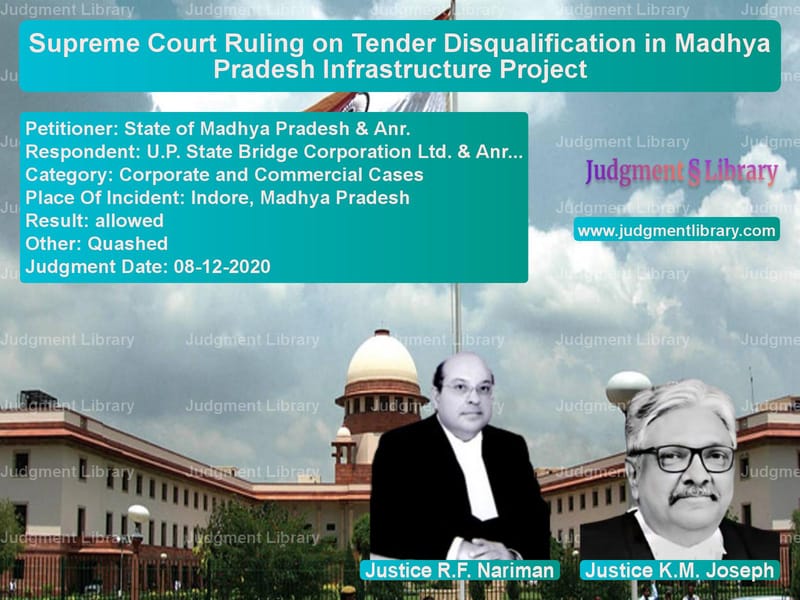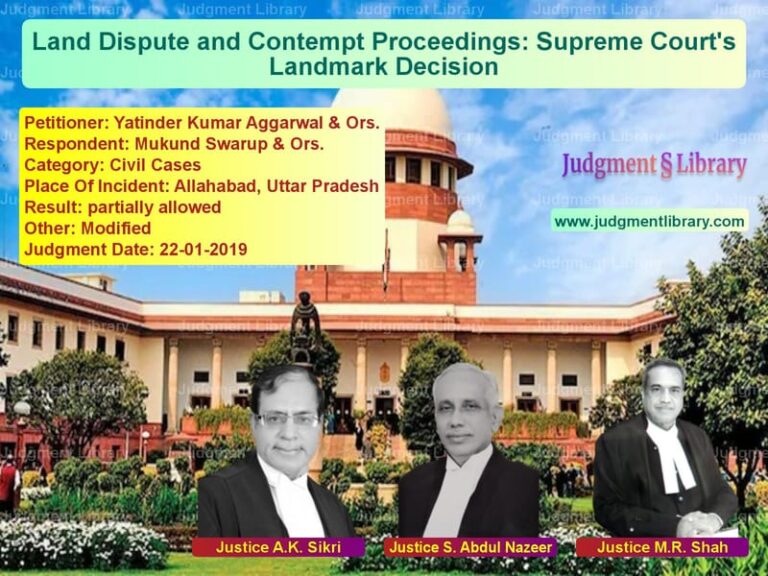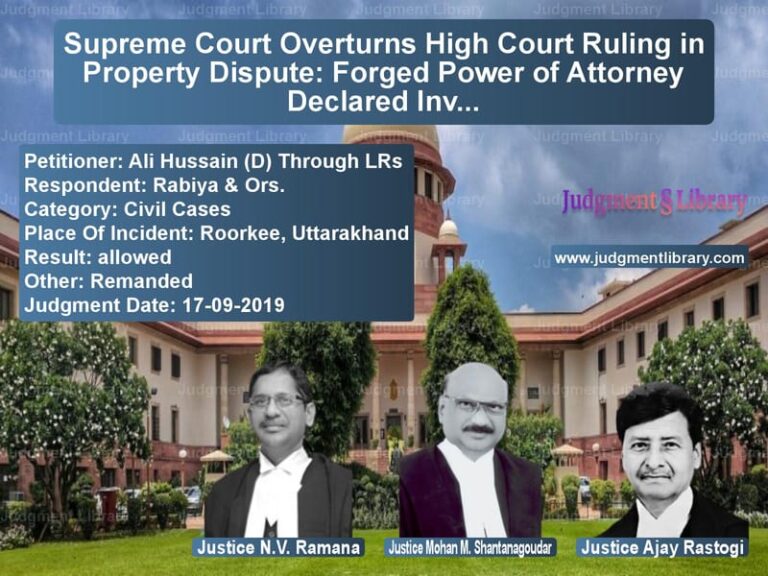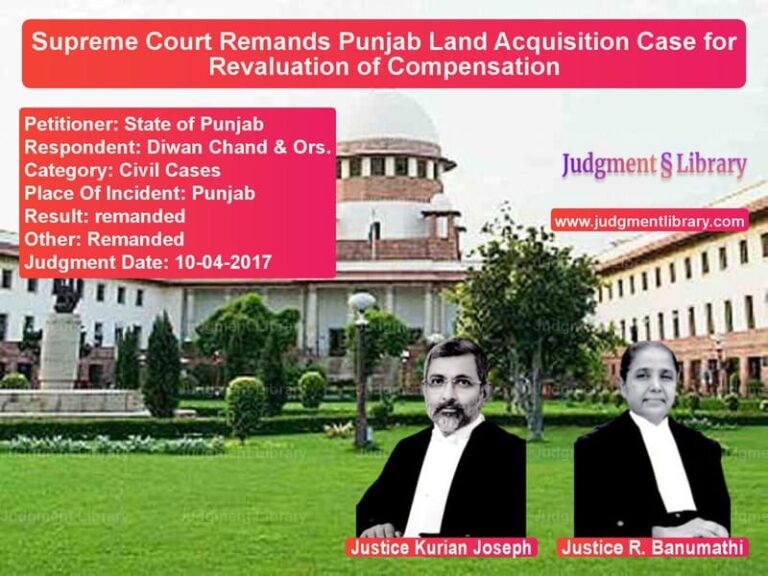Supreme Court Ruling on Tender Disqualification in Madhya Pradesh Infrastructure Project
The case of State of Madhya Pradesh & Anr. vs. U.P. State Bridge Corporation Ltd. & Anr. revolved around the disqualification of a bidder from a major infrastructure project due to alleged misrepresentation in tender documents. The Supreme Court was tasked with deciding whether the disqualification was justified and whether public interest was compromised.
The dispute arose from a tender issued by the Public Works Department (PWD) of Madhya Pradesh for constructing a flyover in Indore. The contract was worth Rs. 272.66 crores and was to be completed within 24 months. The key issue was whether U.P. State Bridge Corporation Ltd. (UPSBC) had failed to disclose material facts about criminal proceedings against it, thereby violating the tender requirements.
Background of the Case
- The tender for a 7.473 km flyover was issued on December 2, 2019 by the Madhya Pradesh PWD.
- The bid documents required full disclosure of any pending investigations or criminal charges.
- UPSBC submitted its bid but allegedly failed to disclose a pending charge sheet related to a collapsed bridge in Varanasi that caused multiple fatalities.
- Based on this omission, UPSBC’s bid was rejected as non-responsive.
- UPSBC challenged this rejection in the Madhya Pradesh High Court, which ruled in its favor and directed the state to award the contract to UPSBC.
- The Madhya Pradesh government appealed the decision before the Supreme Court.
Petitioner’s Arguments
The State of Madhya Pradesh contended:
- UPSBC failed to disclose a charge sheet against it for a bridge collapse, violating the transparency requirement.
- Clause 7(b) of the tender document required disclosure of any pending investigation, which UPSBC ignored.
- The definition of “investigation” should include all criminal proceedings, not just police investigations.
- The rejection was necessary to ensure fair competition and uphold public interest.
- A bid rejection due to misrepresentation falls under the fraudulent practice clause, making UPSBC ineligible.
Respondent’s Arguments
UPSBC countered:
- At the time of bid submission, no formal “investigation” was pending, as the case had progressed to the trial stage.
- The High Court correctly ruled that “investigation” under the Cr.P.C. ends once a charge sheet is filed.
- The omission was unintentional and did not affect UPSBC’s technical qualifications.
- UPSBC’s bid was Rs. 9 crores lower than the next lowest bidder, making rejection against public interest.
- The rejection was arbitrary and violated natural justice.
Supreme Court’s Observations
The Supreme Court, in its judgment delivered by Justices R.F. Nariman and K.M. Joseph, made the following key observations:
1. Definition of “Investigation”
The Court ruled:
“Investigation” includes all stages of criminal proceedings, including charge sheets and pending trials. The tender requirement was broad enough to cover such disclosures.”
2. Misrepresentation and Fraudulent Practice
The Court emphasized that UPSBC’s failure to disclose material facts amounted to misrepresentation:
- “Fraudulent practice” under the tender terms includes suppression of facts or disclosure of incomplete facts.
- Omission of an ongoing criminal case amounts to a fraudulent practice.
3. Judicial Restraint in Tender Matters
The Court reiterated principles from Tata Cellular v. Union of India, stating:
“Courts must defer to the tendering authority’s decision unless it is arbitrary, unreasonable, or tainted with mala fides.”
4. Impact on Public Interest
While UPSBC’s bid was lower, the Court held that transparency in government contracts is paramount:
“Financial advantage cannot justify overlooking procedural violations and misrepresentation.”
Final Judgment
- The Supreme Court overturned the High Court’s decision.
- UPSBC’s bid rejection was upheld.
- The next lowest bidder, Rajkamal Builders, was allowed to undertake the project.
Implications of the Judgment
This ruling has significant implications:
- Strengthens enforcement of disclosure requirements in government tenders.
- Reinforces that misrepresentation in bid documents leads to disqualification.
- Limits judicial interference in administrative contract decisions.
- Emphasizes that procedural integrity in public contracts is more important than financial considerations.
The judgment serves as a precedent for ensuring transparency and fairness in public procurement processes.
Petitioner Name: State of Madhya Pradesh & Anr..Respondent Name: U.P. State Bridge Corporation Ltd. & Anr..Judgment By: Justice R.F. Nariman, Justice K.M. Joseph.Place Of Incident: Indore, Madhya Pradesh.Judgment Date: 08-12-2020.
Don’t miss out on the full details! Download the complete judgment in PDF format below and gain valuable insights instantly!
Download Judgment: State of Madhya Prad vs U.P. State Bridge Co Supreme Court of India Judgment Dated 08-12-2020.pdf
Direct Downlaod Judgment: Direct downlaod this Judgment
See all petitions in unfair trade practices
See all petitions in Corporate Compliance
See all petitions in Contract Disputes
See all petitions in Judgment by Rohinton Fali Nariman
See all petitions in Judgment by K.M. Joseph
See all petitions in allowed
See all petitions in Quashed
See all petitions in supreme court of India judgments December 2020
See all petitions in 2020 judgments
See all posts in Corporate and Commercial Cases Category
See all allowed petitions in Corporate and Commercial Cases Category
See all Dismissed petitions in Corporate and Commercial Cases Category
See all partially allowed petitions in Corporate and Commercial Cases Category







